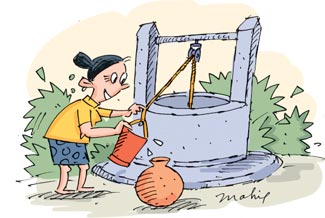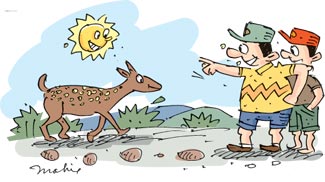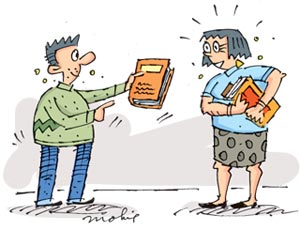|

by R. S. Karunaratne
Joining sentences with ‘and’
and ‘but’
We use ‘and’ to join two sentences when their meanings go well
together.
1. My sister is a nurse.
My brother is a lawyer.
|

Soma is drawing water from the well.
|
My sister is a nurse and my brother is a lawyer.
2. Jeevan is an actor.
Ruvanthi is a dancer.
Jeevan is an actor and Ruvanthi is a dancer.
3. The deer is an innocent animal.
The hare is a timid animal.
The deer is an innocent animal and the hare is a timid animal.
4. Mala loves to read novels.
Hema likes to write novels.
Mala loves to read novels and Hema likes to write them.
5. The police arrest offenders.
The judge punishes them.
The police arrest offenders and the judge punishes them.
We use ‘but’ to join two sentences when their meanings contrast with
each other.
1. Sam enjoys pop music.
Himali likes classical music.
Sam enjoys pop music but Himali likes classical music.
2. The cat is quiet.
The dog is noisy.
The cat is quiet but the dog is noisy.
3. Amal did well in the exam.
Amal failed the exam.
|

The deer is an innocent animal. |
Amal did well but failed the exam.
4. Kanthi tried to jump over the fence.
Kanthi could not jump over the fence.
Kanthi tried to jump over the fence but she could not do so.
5. Soma is drawing water from the well.
Hiran is reading a book.
Soma is drawing water from the well but Hiran is reading a book.
Note
‘Soma is drawing water from the well.’ is a simple sentence because
it has only one finite verb. ‘Soma is drawing water from the well but
Hiran is reading a book.’ is a compound sentence because two simple
sentences are joined together using ‘but’.
Rule
By joining two simple sentences together using ‘and’ or ‘but’, we
make a compound sentence.
Activity
Use ‘and’ or ‘but’ in the blanks. Check your answers with the key.
1. Lalith is noisy .............. Sarath is quiet.
2. Nethmi worked hard ................. passed the exam.
3. I invited all my classmates to my birthday party ..............
some of them did not come.
4. Leon is an editor.............. his wife is a journalist.
5. Sirimal is drawing some cartoons ............. his sister is
sleeping.
6. The stars are shining ................ the sky looks beautiful.
7. I am lazy ............... my brother is hardworking.
8. The school is big ............... the playground is small.
9. Roses are beautiful .............. they smell sweet.
10. I have many friends ................ I like all of them.
Key :
1. but 2. and 3. but 4. and 5. but 6. and 7. but 8. but 9. and 10.
and
Confusable words
There are many confusable words in English. Therefore, it is always
good to remember how to use them correctly.
1. Admission and Admittance
Private schools charge a fee for admission of students to Grade I.
‘No admittance’ is found in warning notices in hospitals and other
places.
2. Advise and advice
‘Advise’ is the verb. ‘Advice’ is the noun.
The principal advised the students not to get absent very often.
We are seeking legal advice to file a case against the errant
company.
3. Affect and effect
‘Affect’ is a verb meaning ‘to influence’.
Smoking will affect your health. Effect is a noun meaning ‘result’.
The medicine I took had no effect on me.
4. Aggravate
‘Aggravate’ means ‘to make worse’. Chain smoking aggravated his
illness.
5. Alternate and alternative
‘Alternate’ means ‘coming each after one of the other kind.’
The alternate numbers in a consecutive series will be 1, 3, 5, 7 etc.
‘Alternative’ means ‘offering a choice between two.’
Socialism is the only alternative to capitalism.
6. Amount
‘Amount’ is used for uncountable nouns.
See the amount of work I have to do. With countable nouns use
‘number’.
The number of teachers is increasing.
7. Beside and besides ‘Beside’ means ‘alongside’.
They walked beside the coffin. ‘Besides’ means ‘in addition.’
Besides cakes, there were plenty of other sweets.
8. Between and among
‘Between’ is used when we talk of two people or things.
The two students shared the meal between them.
If there are more than two people or things, use ‘among’.
There is no animosity among the students who have come from different
countries.
9. Both and each
‘Both’ means ‘two taken together’. Both the chairs cost me Rs.
10,000. ‘Each’ means ‘any number taken one at a time.’
Each of the boys received an apple.
10. Can and may ‘Can’ means ‘to be able to.’
Can you bring the dictionary tomorrow?
‘May’ means ‘to have permission’.
May I go home now?
Starters:
When to use ‘must’ and
‘should’
We use ‘must’ when we think it is necessary or very important to do
something.
My shirt is very dirty. I must wash it.
This is a wonderful novel. You must read it.
I must go to office today. I have to attend a board meeting.
I must go to the dentist now.
She must go for a check-up.
|

This is a wonderful novel. You must read it. |
The past form of ‘must’ is ‘had to’.
I had to go to office yesterday as my boss was on leave.
We had to memorise the poem as the teacher wanted us to do so.
I had to go to the bank yesterday to withdraw Rs 50,000.
The floor was very dirty. I had to clean it.
We had to wait for a train as the buses were not available.
We use ‘must not’ or ‘mustn’t’ when it is important not to do
something or when it is a bad thing to do.
You mustn’t forget to take your umbrella.
We mustn’t smoke because it causes lung cancer.
I mustn’t get up early tomorrow because it is a holiday.
You mustn’t be late tomorrow as there will be an important meeting.
This certificate is very important. You mustn’t lose it.
Should
We use ‘should’ when it is a good thing to do.
You should attend school regularly to pass your examinations.
It is a good play. You should see it.
When you play volleyball you should always watch the ball.
I think you should have a hair-cut.
You look tired. You should take a rest.
We often use ‘think’ with ‘should’.
I think I should speak to him.
Do you think you should resign?
I don’t think you should go abroad.
You don’t look well. I think you should see a doctor.
I think I should go home now.
‘Must’ is stronger than ‘should’.
Here’s the application form. You should fill it.
The judge has found you guilty. You must go to jail.
This hotel is very expensive. I think I should leave it.
They must protect the rare animals in the jungles.
You should obey the laws of the land.
[Activity]
Complete the following sentences with ‘should’, ‘shouldn’t’, ‘must’,
‘mustn’t’ or ‘had to’. Check your answers with the key.
1. Nirmala looks tired. She ............... go to bed.
2. Children ............ clean their teeth at least twice a day.
3. You .................. work so hard to get the promotion.
4. Thelma ................... eat too much because she’s getting fat.
5. He is a good teacher. You............ attend his class.
6. You ................ fail to take your National Identity Card.
7. We ................. travel by train as there were no buses.
8. She .................. break rest to revise her lessons.
9. Nobody ....................... step on the grass.
10. Adults ....................... know, how to protect their children.
Key:
1. should 2. should 3. shouldn’t 4. shouldn’t 5. must 6. mustn’t 7.
had to 8. had to 9. should 10. must
Containers and
contents
Match the containers in Column ‘A’ with contents in Column ‘B’. Check
your answers with the key.
[Column A]
1. Barrel
2. Briefcase
3. Bunker
4. Butt
5. Caddy
6. Carafe
7. Carton
8. Cask
9. Compact
10. Drum
11. Ewer
12. Hangar
13. Holster
14. Keg
15. Phial
16. Portmanteau
17. Punnet
18. Seabbard
19. Urn
20. Safe
[Column B]
i. tea
ii. cider
iii. clothing
iv. money
v. oil
vi. documents
vii. ashes of the dead
viii.ice-cream
ix. rum
x. beer
xi. face powder
xii. wine
xiii. water
xiv. aircraft
xv. pistol
xvi. rainwater
xvii. medicine
xviii. strawberries
xix. sword
xx. coal
Key:
1. x 2. vi 3. xx 4. xvi 5. i. 6. xii 7. viii 8. ii 9. xi 10. v 11.
xiii 12. xiv 13. xv 14. ix 15. xvii 16. iii 17. xviii18. xix 19. vii 20.
iv
Add a vowel, make a
word
There are five vowels in English. They are: a, e, i, o, and u. Except
a few words, you cannot find a word without one of these vowels. In each
of the following words one vowel is missing. Fill in the blanks with
vowels and check your answers with the key.
1. H...g: a pig bred for its meat
2. Ho...st: to raise something to a higher position
3. Hogw...sh: stupid talk
4. Hom...land: one’s native country
5. Hon...y: a sweet sticky yellowish substance made by bees from nectar
6. H...nk: the cry of the wild goose
7. Ho...dlum: a violent and noisy young man
8. Hor...zon: the line at which the earth and sky appear to meet
9. Horn...t: a large wasp that can give a severe sting
10. Horr...ble: causing horror
11. H...se: a flexible tube made of rubber, plastic or canvas
12. Host...le: showing strong dislike
13. H...thead: a person who often acts too quickly, without thinking of
the consequences
14. H...und: a dog used for hunting
15. Hov...l: a small house that is not fit to live in
16. H...wl: the long cry of a dog
17. H...wler: a foolish and obvious mistake
18. H...b: the central part of a wheel
19. H...bbub: a loud confused noise
20. Hubr...s: excessive pride
Key:
1. o 2. i 3. a 4. e 5. e 6. o 7. o 8. i 9. e 10. I 11. o 12. i 13. o
14. o 15. e 16. o 17. o 18. u 19. u 20. i |

